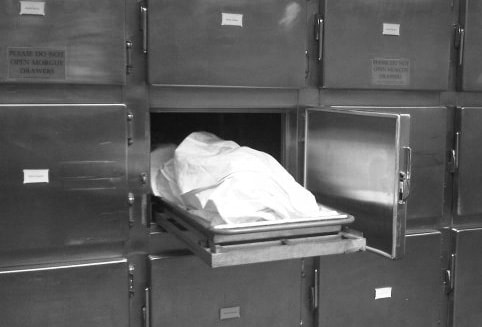
Dead Bodies
Essay 13 Finite
The Stylus
by gayla m. mills
When I was in college, I bought my groceries by working as an emergency room flunkey. I got paid $2.70 an hour to clean up the instrument trays, take vital signs of patients, drop off lab specimens, and, oh yes, take the people who had just died to the morgue.
It was strange each time, pushing the stretcher with the lifeless form down the hallway, alone. I mean I figured I was alone, going down the hallway, under the fluorescent lights. I tried not to think about how the carcass before me, hidden under the sheet, had been a person just a short while ago. He’d been breathing and thinking and feeling—probably feeling fear, considering his condition was serious enough to kill him, and maybe anger, that he was separated from those who knew him, who cared enough to bring him during the night to the hospital, who were waiting anxiously to hear the news. And all of this, these dramatic last moments, while he looked up at the ceiling, the one with the tiles resting on a metal chessboard, with holes large enough to let the fake foam breath, large enough to see while lying on his back and wondering how many more procedures they would do. And the tube is down his throat now, and the pace is quickening as the people move rapidly, with experience and calm, but rapidly. They know something he doesn’t, and this is disturbing.
And then he’s not worried any longer because he’s no longer able to think or feel. Things didn’t turn out as he expected.
So I would take the patients, I mean the dead bodies, down the hallway with the same kind of foam tile ceiling, and I’d arrive in the basement and open the morgue door. Someone was supposed to be there already, but sometimes I had to wait, briefly, with the body, in the sterile room. Then we’d open the refrigerator door, one of nine on the wall, just like they do on TV. Except not quite like that, because this was a real room with a real body and we were real too. And we’d have to somehow get the body onto the metal tray, which could be hard if the person was fat. That was one of those moments when I wished more people would take care of themselves. And then we’d slide the tray in as we felt the cold cold air rushing out. And it didn’t feel quite right closing the door. Because it was dark and chilled in there. It couldn’t be all that comfortable.
I’ve heard that 95% of people die in hospitals. I don’t want to be one of them.
(May 2011)
Next
Essay 13 Finite
The Stylus
by gayla m. mills
When I was in college, I bought my groceries by working as an emergency room flunkey. I got paid $2.70 an hour to clean up the instrument trays, take vital signs of patients, drop off lab specimens, and, oh yes, take the people who had just died to the morgue.
It was strange each time, pushing the stretcher with the lifeless form down the hallway, alone. I mean I figured I was alone, going down the hallway, under the fluorescent lights. I tried not to think about how the carcass before me, hidden under the sheet, had been a person just a short while ago. He’d been breathing and thinking and feeling—probably feeling fear, considering his condition was serious enough to kill him, and maybe anger, that he was separated from those who knew him, who cared enough to bring him during the night to the hospital, who were waiting anxiously to hear the news. And all of this, these dramatic last moments, while he looked up at the ceiling, the one with the tiles resting on a metal chessboard, with holes large enough to let the fake foam breath, large enough to see while lying on his back and wondering how many more procedures they would do. And the tube is down his throat now, and the pace is quickening as the people move rapidly, with experience and calm, but rapidly. They know something he doesn’t, and this is disturbing.
And then he’s not worried any longer because he’s no longer able to think or feel. Things didn’t turn out as he expected.
So I would take the patients, I mean the dead bodies, down the hallway with the same kind of foam tile ceiling, and I’d arrive in the basement and open the morgue door. Someone was supposed to be there already, but sometimes I had to wait, briefly, with the body, in the sterile room. Then we’d open the refrigerator door, one of nine on the wall, just like they do on TV. Except not quite like that, because this was a real room with a real body and we were real too. And we’d have to somehow get the body onto the metal tray, which could be hard if the person was fat. That was one of those moments when I wished more people would take care of themselves. And then we’d slide the tray in as we felt the cold cold air rushing out. And it didn’t feel quite right closing the door. Because it was dark and chilled in there. It couldn’t be all that comfortable.
I’ve heard that 95% of people die in hospitals. I don’t want to be one of them.
(May 2011)
Next